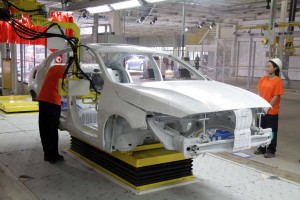The financial turmoil in China is actually working to the advantage of Volvo Cars. The Swedish automaker, now owned by China’s Geely, is getting more control of key assets, such as its factory in Chengdu, as part of a deal valued at $356 million.
Volvo Cars executives said the decision to take control of its three joint venture operations in China will accurately reflect its growing presence in the Chinese market . It also fixes the values of the assets in case of a merger or if they are put up as collateral for a major loan in the future, observers said.
The downside is that Volvo is being hammered, like the rest of the auto industry, by the worst slowdown in the Chinese automotive market in two decades. The downturn could push Volvo to expand plans to export cars from China to the U.S. and other established markets.
Volvo Cars now owns 50% of its Chinese joint ventures alongside Geely Holdings, the company’s principal owner. The joint ventures include its car manufacturing facilities in Chengdu and Daqing, its engine manufacturing facility in Zhangjiakou and its research and development center in Shanghai had been owned exclusively by Geely.
The change allows Volvo to fully consolidate its China joint ventures, providing a more accurate financial and operational picture of the company as it continues to expand in China and elsewhere in the world including the U.S.
“The incorporation of the Chinese entities is an important step towards the long term objectives to capture the growth and sourcing potential in China,” said Håkan Samuelsson, President and Chief Executive.
(Volvo bets big on performance with Polestar acquisition. Click Here for the full story.)
Volvo Car Group, the premium car maker, has reported an operating profit increased by 71% to $193.4 million for the first half of 2015 and net income more than doubled, while revenue increased by 12 %, according to the company financial report for the first half of 2015.
Retail sales during the first six months of 2015 were 232,284 cars, up slightly compared to 229,013 in the same period last year, driven primarily by strong demand in Western Europe. Sales in China were flat while sales in the United States stabilized during the period.
“It has been a good first half of the year, with an improved financial performance,” said Håkan Samuelsson, President and Chief Executive. “We have been implementing a transformation plan since 2010 and this financial result demonstrates that we continue to be on the right track. For the full year, we expect a substantial increase in profits.”
(Huge explosion in Tianjin, China forces Toyota to halt production. Click Herefor more.)
Volvo is investing in a global transformation as part of its long term strategic ambition to enhance its position as a global premium car maker. Driven by the complete renewal of its product range, Volvo is aiming to almost double sales to around 800,000 cars a year in the medium term.
In the first six months of 2015, Volvo Cars also took several important steps towards achieving these goals.
The company started production of the new Volvo XC90, the first of its new generation of cars on its SPA platform. So far, the company has received close to 57,000 orders and started delivering the car to customers in the spring. In May, a third shift was added at the Torslanda plant in Sweden, creating nearly 1,500 new manufacturing jobs.
In the first half, Volvo also announced it will build a new manufacturing facility in South Carolina. Construction on the $500 million plant near Charleston will start this fall and the new facility will have initial production of around 100,000 cars per year and be completed by 2018.
The U.S. could become even more critical to Volvo if the slowdown in China drags on. The Swedish maker recently began shipping a stretched version of its S60 sedan from the Chengdu plant to the States. It is the first Chinese-made vehicle from a major manufacturer to be sold in the U.S.
(GM takes heat over plans to bring Chinese-made Buick SUV to US. Click Here for the story.)


I will buy new Volvo only if it’s made in Torslanda plant and not in China. Full stop.